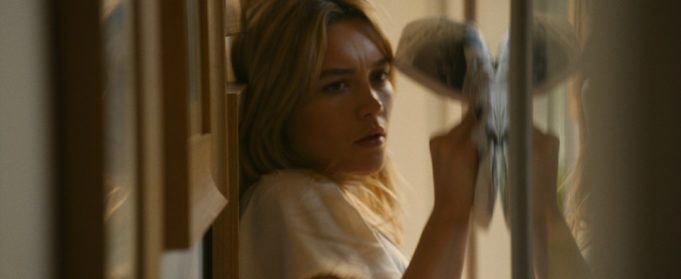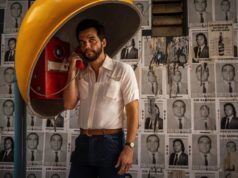I don’t usually get into the particulars of how I do my job, because I don’t think you’ll find it very interesting. Today, though, I need to do it. Don’t Worry Darling arrives in our multiplexes amid a storm of offscreen drama, and while it’s certainly neither the first nor the last movie to do that, it means I have to look at it through two different lenses. I need to take in the controversy, but I also need to try to see the movie without it as best I can, because that’s how people watching it 50 years from now will see it. It’s not easy, but if it were, someone less talented than me would have this job. Having taken the film in, I say that this movie has definite issues, but I do think it’s better than the reviews it has received.
The story is set in a suburban community called Victory in what looks to be southern California in the mid-1950s. The men go off to work every day, while their wives live idyllic lives as long as they don’t leave the city limits, drive cars, or ask their husbands what they’re working on at the mysterious place in the desert called The Victory Project. Here, Alice Chambers (Florence Pugh) lives the life of a rich housewife when she starts having troubling hallucinations. The town doctor (Timothy Simons) prescribes her some happy pills, but would you trust a doctor who openly discusses the details of other patients’ cases with you and leaves his briefcase in your house for you to look through his files? No, you wouldn’t!
A story like this depends on planting odd details that clue us in that something is off underneath the aggressively normal façade. Director Olivia Wilde doesn’t have the subtlest touch with this — when Alice crushes a supermarket egg in her hand and sees that it contains nothing but air, nothing comes of this. The same goes when Alice suddenly starts wrapping her head in plastic wrap to suffocate herself. Too often the style here comes off like film-school references: Victory is a series of Douglas Sirk interiors, while there’s an Alejandro Jodorowsky-like acid trip and Busby Berkeley-style musical numbers. Other filmmakers (Jordan Peele comes to mind) are better at injecting suspense into such a setting. There is one effective bit when Alice sees a fellow housewife (KiKi Layne) commit suicide on her front lawn and is prevented from reaching the body by a group of red-uniformed men who come out of nowhere. Notwithstanding, I think this filmmaker doesn’t have the talent for phantasmagoria.
Better stuff comes in the back half. If you watched Wilde’s directorial debut Booksmart, you saw the makings of a thriller director with a great understanding of momentum and scene transitions, and that kicks in when Alice tries to escape the clutches of the people in control of Victory. There is a Shyamalan-like plot twist here, and I spent the early part of this film wondering whether this was the same plot as The Village. (It isn’t, but then, it’s also not not The Village. Alice is named after Lewis Carroll’s famous heroine for a reason.) Alice’s flight from her neighborhood cul-de-sac and then through the desert in her husband’s 1953 Corvette is well-managed. Victory is the project of a bunch of men with fragile egos imprisoning their women in a gilded cage, and I see evidence every day that there are enough such men in the world who would sign up for this. Also, Chris Pine turns up as the cult-leader head of the Victory Project who combines aspects of Jordan Peterson, Trump, and Hitler. His ultimate fate here made me laugh my most evil laugh.
Harry Styles plays Alice’s husband, and the story provides logic for his accent wavering between American and British. He’s effective in spots (especially in the scene when he betrays his wife to the men in red), and Wilde herself portrays a fellow housewife and draws an unsettling portrait of a woman who has willfully chosen Victory’s bleak existence. Still, the main thing that keeps Don’t Worry Darling from turning to mush is Pugh’s performance as someone clinging to her sanity while trying to find out what kind of hell she’s in. It’s not easy playing most of a film in a state of paranoid terror, and somehow Pugh keeps it from becoming monotonous, especially as she discovers how her husband and everyone else has used her. This film is one more piece of evidence of this young British actress’ formidable powers, which give this thriller a through line for us to follow.
Don’t Worry Darling
Starring Florence Pugh and Harry Styles. Directed by Olivia Wilde. Written by Katie Silberman. Rated R.












